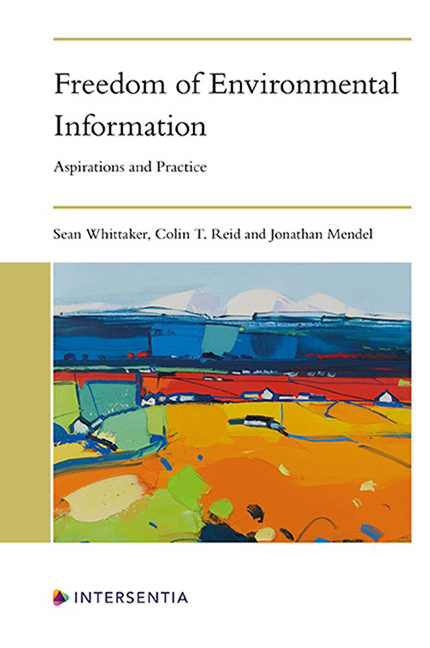Chapter 2 - Theoretical and Legal Frameworks
Published online by Cambridge University Press: 15 November 2023
Summary
Analysis of the right of access to environmental information is generally conducted through one of two legal perspectives. The work here offers insights beyond these typical approaches both by drawing more on social theory and through empirical study of how the right is operating in practice. The first conventional approach, relying on a widespread legal methodology, studies the legal framework and also the aims and aspirations that underpin the creation of the right, “grappling with the foundational concepts that inspire the ambitious vision” that lies behind it. The second, narrower approach seeks to examine the right through the doctrinal method of analysis, an approach which focuses on the internal working and operation of “black-letter” law and its position within the legal hierarchy. The latter perspective follows the legal origins of the right and the way it has been embodied. From the Stockholm Declaration through the Rio Declaration and the Aarhus Convention to the measures ensuring its implementation in the EU and Scotland, the recognition and development of the right have been dominated by the law and the legal procedures which give it effect. The doctrinal methodology, with its basis in legal study, thus dominates discussion and analysis of the right of access to environmental information.
Both approaches bring numerous benefits in analysing the right of access to environmental information. The focus on the underlying concepts and ambitions enables access to information to be considered in the wider context of analysing governance. The doctrinal approach, by adopting an internal perspective on the laws that govern the right, offers analysis that can consider the internal logic of these laws and whether they are aligned with the objectives that they are seeking to achieve. However, while both approaches provide valuable perspectives on the right, they do not consider whether the law operates in the “real world” as intended. Described as the gap between “the law in the books” and “the law in action”, there is a risk that relying wholly on either methodology will result in a distorted understanding of the right that is based on how the law was intended to operate or is assumed to be operating rather than how it actually operates in practice.
- Type
- Chapter
- Information
- Freedom of Environmental InformationAspirations and Practice, pp. 23 - 56Publisher: IntersentiaPrint publication year: 2023



